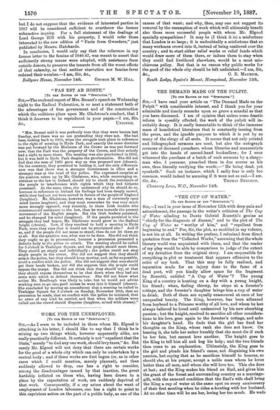" FAS EST AB HOSTE."
70 Tiff Burros Of THE 4.8PECTATOlt..] Sr ,—The enclosed report of Mrs. Besant's speech on Wednesday night to the Radical Federation, is so neat a statement both of the advantages of firm government and of the construction which the seditious place upon Mr. Gladstone's conduct, that I think it deserves to be reproduced in your paper.—I am, Sir,
Are, 'UNIONIST.
Mrs. Resent said it was perfectly Erne that they were beaten last Sunday, and there was no use pretending they were not. She had been looking back to 1866, when the struggle took place in reference to the right of meeting in Hyde Park, and exactly the same doctrine was put forward by the Ministers of the Crown as was put forward now, that the Park was the property of the Crown, and that nobody had a right to meet there. The meeting was also proclaimed in 1866, but it was held in Hyde Park despite the proclamation. She did not find that the men of 1866 gave way as was proposed now (cheers). On the contrary, they persisted in holding it, and the only difference now was that there was a stronger Government in offioe and a stronger mac at the bead of the police. She expressed surprise at the position taken up by Mr. Gladstone, who, while encouraging re- sistance to the law in Ireland, should try to check the resistance of the people to interference with rights which they had hitherto possessed. At the same time, she understood why be should do so, because in reference to Ireland his feelings had been deeply moved, while they had not yet been moved in favour of the people of England (laughter). Mr. Gladstone, however, was a man of extremely open mind (more laughter), and they must remember be was very much more strongly opposed, very recently, to those Irish leaders who countenanced resistance to the law, than he was towards the present movement of the English people. But the Irish leaders persisted, and he changed his mind (laughter). If the people persisted in the struggle they had began, Mr. Gladstone would grow to the Radical height (cheers). Now, if they resolved to hold a meeting in Hyde Park, were they sure that it would not be proclaimed also F And if BO, and if the people did not mean to stand, then do not let them go at all. Bat the question was, what was to be done. She did not think they ought to go in processions, because a procession presented a definite body to the police to attack. The meeting should be called for 3 o'clock in Trafalgar Square, and the people should meet there. They should go singly and individually; the police could not stop single people in the street. She did not suggest that they should attack the police, but they should keep moving, and, as far as possible, avoid a conflict with the police. She did not suggest that men should get their heads broken, nor did she suppose that the people could oppose the troops. She did not think that they should try, or that they should expose themselves to be shot down when they had not arms with which to defend themselves. She did not know what action Mr. Bradlaugh was likely to take, bat he would not advise working men to go into peril unless he went into it himself (cheers). She concluded by moving an amendment that a meeting be called in Trafalgar Square for 3 o'clock on Sunday, November 20th, that no procession be made, that no conflict with the police be initiated, that no arms of any kind be carried, and that when the soldiers were called out the crowd should disperse (laughter, mixed with cheers)."























































 Previous page
Previous page